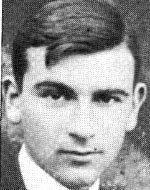Kaufman-Lieber, Alexander
Son of Hanna Sarah and Hertz. He was born in April 1913 in Krasno, Poland. When he was about a year old, World War I broke out and his mother and brothers joined their grandparents in the Austro-Hungarian kingdom. In spite of the suffering that accompanied his childhood, he was a happy, easy-to-please and quick-paced child, graduating from elementary school in Poland and continuing high school in Germany, where he became an outstanding student. When his mother married again he moved to his grandfather’s house and worked in a rubber factory Poland, and at the same time he joined the Betar youth organization and acted as a guide. In 1936 he immigrated to Eretz Israel and joined the rest of his family who lived and worked in a factory in the northern Dead Sea. Alex found work in a factory in the south. During his free hours, he acquired, in his own right, control of Hebrew and literary and spoken Arabic. “Every three weeks he came for a long vacation, and these were the best days of our lives, and Alex brought us closer to the world of music and theater, took us on tours and trips in Israel and influenced us with joy of life and love of the land and its landscapes.” In 1941 he enlisted, in accordance with the call of the national institutions, to the British Army, the Hebrew Transport Unit, which was part of the Al-Alamein defense system. On April 28, 1943, he sailed with his comrades on the deck of the “Aryanpura” from the Egyptian port of Alexandria to its first destination from Malta to participate in the Allied invasion of Sicily. On 27 Nisan, 1.5.1943, in the early evening, a group of German bombers bombed the convoy of ships that the “Aryanpora” headed. The ship sustained two direct hits and four minutes later it sank into the water. One hundred and forty of the Israeli soldiers on board were drowned, including Alex. He was 30 years old when he fell. He left a mother, a brother, and two sisters. At Mount Herzl in Jerusalem a monument was erected to commemorate the soldiers of the unit who descended to the sea. The monument is like a ship and next to it is a water pool with the names of those missing in the bottom. This fallen hero is a “maklan” – a hero whose burial place is unknown.
